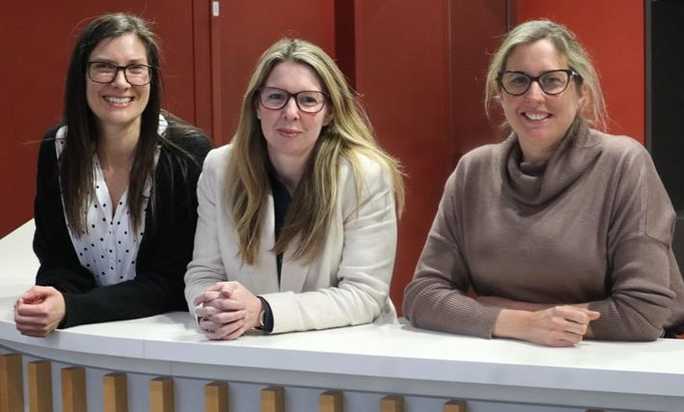
Health
More than meal plans and nutrition supplements – celebrating the varied and vital role of dietitians.
16 Jun, 2025
Caroline Hill was first inspired to become a dietitian during a high school food technology course.
“We studied nutrition in developing countries and it was fascinating. Later, my research project at university looked at the ideal macronutrient balance for food aid in developing countries, but my real passion is paediatric dietetics and supporting parents and families in nourishing their kids amidst the chaos of life!”
Caroline has since gone on to have a 25-year career as a dietitian with NSW Health and is now the Statewide Service Development and Policy Implementation Lead and Senior Dietitian at InsideOut where she supports dietitians and teams as they care for people with an eating disorder and their families and carers.
“It's exciting to be able to support change within the health system so that people with an eating disorder and their families can access quality, evidence-based treatment close to home,” she said.
Maureen Moerbeck decided to pursue a career as a dietitian after feeling helpless as she watched someone close to her struggle with an eating disorder.
“Watching them go through such a difficult experience made me realise how important proper support and guidance are in recovery. That experience inspired me to become a dietitian and work in the field of eating disorders so I could help others navigate their relationship with food and body and support them on their recovery journey,” she said.
Maureen has since co-authored and published a book designed to help individuals break free from dieting and disordered eating patterns, and now works to upskill clinicians to provide safe and effective care for individuals with eating disorders by delivering the implementation of the NSW Service Plan for People with Eating Disorders at InsideOut. She is also involved in developing and reviewing clinical guidelines and providing ongoing support to Eating Disorder Coordinators and clinicians within NSW Health.
It was Vanessa Allen’s fascination with the way nutrition could influence health and wellbeing and her desire to help people optimise their health and improve their lives that led her to a career as a dietitian.
“I love the complexity of food in people’s lives — how it connects with identity, emotions, health and wellbeing. It's a privilege to work alongside people to explore this relationship and support them in improving their quality of life,” she said.
Vanessa now supports dietitians across NSW to deliver high-quality care for people with eating disorders by working closely with individual clinicians, multidisciplinary teams and policy makers to build capacity, share knowledge, and improve treatment outcomes.
InsideOut’s dietitians all identified the satisfaction they get from helping people improve their health as what they enjoy most about their roles.
“It’s often the small, quiet wins that I’m most proud of — when a client feels better by nourishing their body; when someone accesses care they otherwise wouldn’t have, or when a health professional gains confidence after education or support. Those moments are deeply rewarding,” said Vanessa Allen.
“What I enjoy most about working as a dietitian is being part of someone’s recovery journey. It’s incredibly rewarding to support individuals through challenging times, and to empower them with the knowledge, tools, and confidence they need to make meaningful changes and reach their goals,” said Maureen Moerbeck.
“I love working alongside families and supporting them as they navigate food and eating and family battlegrounds; enabling them to reestablish a positive relationship with food without fear and guilt,” said Caroline Hill.
“We are about to release a Dietitian eLearning specifically on managing a young person admitted for medical instability with an eating disorder to a paediatric ward. This was the training I wished I had when I started working in this space.”
When it comes to the role dietitians play in people’s lives, our dietitians all acknowledge that that there are misconceptions around what they do.
“Dietetics is so much more than meal plans and nutrition supplements — it's about understanding people’s relationship with food and supporting them to nourish both body and mind,” said Vanessa Allen.
Caroline Hill explained the role dietitians play in providing evidence-based nutritional guidance at a time when high societal expectations can often lead people to accept advice from less reliable sources.
“There are so many confusing health messages in the media and pressures and expectations from society around food to eat ‘right’ or ‘clean’ or ‘healthy’,” she said.
“Dietitians aren’t about restricting food or counting calories. Dietitians are here to provide sound advice and work alongside you and support the goals you have around food, eating and mealtimes for yourself and your family.”
Maureen Moerbeck was eager to dispel the myth of dietitians as focused on size, weight loss and dieting.
“Being a dietitian isn’t about telling people what to eat or helping them lose weight. Our work is rooted in nutrition counselling—building supportive, non-judgemental relationships to help individuals make sustainable changes that align with their values and goals,” she said.
“The field is moving away from a weight-centric approach, because we know that health isn’t defined by body size, and that focusing on weight loss can often cause more harm than good, both physically and psychologically.”